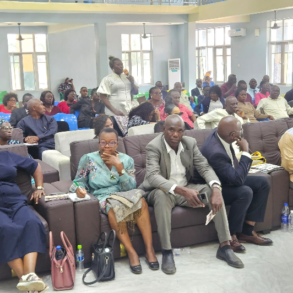By Odili Ogochukwu and Gaius-Okoko Ufuoma Judith
Introduction
A university is an institution of higher learning and research that grants academic degrees and certifications. It is a community of scholars, students, and professionals dedicated to knowledge creation and dissemination as well as intellectual inquiry and discovery, critical thinking and analysis.
According to Okebukola (2011), university inculcates innovative and entrepreneurial skills, personal and professional development. It provides undergraduates and graduates degree programs, research opportunities and projects. It is a breeding ground for academic and professional training, cultural and extracurricular activities, networking and career opportunities.
Consenting to the above, Adekola (2004), said university is essential for developing future leaders and advancement of knowledge and understanding, hence, addressing societal ills by fostering creativity and novelty.
In recognition of the above, it is, however, paramount to note that universities play a vital role in shaping individuals, communities, and societies, and are crucial for advancing human knowledge and progress as it promotes cultural and intellectual diversity. It is on this foundation that Fashanu added that educational institution focuses on the need to give their youngsters training in the skill that they will require later in life.
Put differently, to actualize university objectives, the national universities commission, NUC, as a statutory agency in 1962, upon the recommendation of the Ashby commission became a statutory body in 1974. The commission was established to oversee the affairs of the universities which include granting approval establishment of higher institutions offering degree programmes, approval for all academic programmes run in the universities, ensuring quality assurance of all academic programmes offered in Nigeria universities, among others (Akpotu, 2014).
By implication, the university is geared towards development of the community and individual person. Helps in the production of high level manpower and inculcate the right values for the survival of individual and society.
Reacting to the negation that has prevented the university from achieving its objectives, Nwadiani in Arubayi et al (2013) decried the deplorable situation with the Nigerian Universities, saying that “the decay in the university system is pervasive. It runs deep in the academic sphere as well as in the social life. No strata of the university community, students, teachers, workers or Administrators seem to totally stand above the rot.”
Nevertheless, this paper x-rays the university autonomy, academic freedom and equity in Nigeria with focus on advent of university autonomy, government policy on autonomy as well as governance and challenges in steering the university affairs in the face of freedom and autonomy.
UNIVERSITY AUTONOMY
University autonomy refers to the independence and self-governance of universities to make their own decisions, free from external control or interference. It encompasses academic, administrative, and financial autonomy, enabling universities to determine their own academic programs, research priorities, and curriculum.
The autonomy exerts managing of university’s affairs which includes budgeting, staffing, and resource allocation as well as making decisions on admissions, faculty appointments, and promotions. It involves the university setting their own standards and quality assurance processes.
Tapper and Salter (1995) noted that autonomy involves the right of the university to devise its own curriculum, select, promote and discipline its own faculty, admit and expel students, pass judgment on students’ performances and award degrees. Autonomy is, however, meaningless without the features or traits of academic freedom.
The implicit in the above assertions are notion that autonomy provides a framework for the university to explore the dynamism in research and innovation without undue external influence or interference. University autonomy is essential for Academic freedom and innovation, pursuing research and knowledge without censorship and ensuring quality education and academic excellence.
It facilitates institutional innovation and entrepreneurship by attracting and retaining top talent among faculty and students. Autonomy, however, allows universities to respond to societal needs, drive innovation, and contribute to the development of their communities, while maintaining accountability and transparency.
PITFALLS OF UNIVERSITY AUTONOMY
While University Autonomy is essential for the advancement of knowledge and creativity, there are also potential disadvantages to consider. The fall out of Autonomy ranges from misuse of freedom, promotion of harmful or false information, lack of accountability – without proper oversight. Academics may engage in unethical research practices – promotion of harmful ideas as academic freedom can be used to promote hateful or discriminatory ideas. Conflicts of interest – academics may prioritize personal interests over the greater good, unequal power dynamics to exploitation of junior staff by the perceived senior.
Other possible implications of University Autonomy include poor resource management, limiting access for underrepresented groups and decline in academic quality. Without external standards, academic quality may suffer.
BRIEF HISTORY OF UNIVERSITY AUTONOMY IN NIGERIA
University autonomy in Nigeria has a complex history, with various milestones and challenges. The key events that mark the advent of university autonomy in Nigeria were categorized as follows:
Pre-Independence
Post Independence and
Establishment of National Universities Commission
Pre-Independence (1940s-1960): Nigerian universities were established as extensions of British universities, with limited autonomy.
Post-Independence (1960s-1970s): Nigerian universities gained more autonomy, but still faced government interference.
Establishment of National Universities Commission (1975): The Nigerian Government established the National Universities Commission (NUC) to oversee university affairs, including funding and regulation. In 1992, the Federal Government granted universities greater autonomy, allowing them to manage their own affairs, including staff recruitment and promotion. While in 1993, the Universities (Miscellaneous Provisions) Act was passed, granting universities more autonomy in academic and administrative matters. The National Universities Commission (NUC) in 2003 re-established to regulate and accredit university programs, ensuring quality control. In 2007, the Nigerian
Government introduced the University Autonomy Act, granting universities full autonomy in academic, administrative, and financial matters. From 2010, Universities in Nigeria continued to struggle with funding, infrastructure, and political interference, despite the autonomy granted. Today, university autonomy in Nigeria remains a work in progress, with ongoing efforts to balance institutional independence with government oversight and accountability.
CATEGORIES OF UNIVERSITY AUTONOMY
University autonomy can be categorized into several dimensions, including:
1. Academic Autonomy: The University, under this category enjoys the liberty of curriculum design and development, academic programs and course offerings, research priorities and funding and faculty hiring and promotion. This autonomy enables the university to determine contents and details of the curricula and to decide on the option for academic expansion.
2. Administrative and Governance Autonomy: Government Policy on Autonomy for Universities in 2000 provides that the University will free with Governing Councils not only to appoint and remove Vice-Chancellors, but also determine their payment structure.
Other areas to be considered regarding Administrative Autonomy include University governance and leadership, Budgeting and financial management, Staff hiring, Infrastructure development and maintenance.
It also involves the University statutes and regulations, Decision-making processes and authority, accountability and transparency mechanisms.
3. Financial Autonomy: this includes – Tuition setting and fee structure, Funding allocation and resource management, Grants and contracts management, Endowment and investment management.
4. Legal Autonomy: This has to do with statutory recognition and establishment, Legal status and powers, Regulatory compliance and exemptions, judicial autonomy and jurisdiction.
5. Cultural Autonomy: Institutional identity and values, Academic freedom and expression, Campus culture and community.
6. International Autonomy: Global partnerships and collaborations International student recruitment and exchange, Research collaborations and funding, Global reputation and ranking these categories are not mutually exclusive, and university autonomy often intersects across multiple dimensions.
ACADEMIC EQUITY
Academic equity refers to the principle of fairness and justice in academic settings; ensuring that all individuals have equal opportunities to succeed and reach their full potential. It encompasses equal access to education and resources, inclusive learning environments, diversity, equity, and inclusion initiatives. Equity has to do with addressing systemic barriers and biases bedeviling academic system.
Ihurulam (2013:144) said the problem of equity in education is a “recurring one in every modern society. The provision of education is very complex task in both homogenous and heterogeneous society. She added that its cause stems from the desire to satisfy all the component parts of the country.”
Equity, however, promotes representation and belonging and ensures equal opportunities for academic success. It guarantees accommodations and support educational services as provided by Nigeria’s philosophy of education as stated in national policy on education (2004) assuring equal access to educational opportunities for all citizens in the country at primary, secondary and tertiary levels, both at inside and outside the formal school system.
While emphasizing on the dimensions of access and equity in education, Okunamiri (1999) identified three scopes of education equality. They are:
1. Formal Equality of Access
2. Equality of content
3. Equality of performance
Okunamiri furthered that formal equality access is the mere participation in education system, and does not have a strong effect on the distribution of benefits incurable from participation in educational system. The Equality of content is assessed by pupil and teacher time, materials and building, equality of teaching for the child, and peer group influence on individual. The equality of performance is measured by the teacher’s education level, though; high level of education does guarantee improved teaching.
Addressing the disparities in academic outcomes Okunamiri noted that Academic Equity reduces achievement gaps, enhances student success and retention. It promotes social justice and equality by prioritizing academic equity, institutions can create a more just and inclusive environment, allowing all individuals to thrive and succeed.
While academic equity is essential for promoting fairness and inclusivity, it is also paramount to note some of its challenges. It’s important to acknowledge these potential demerits and strive for balanced approaches that promote equity while maintaining academic rigor and excellence.
1. Lowering standards: Some initiatives aimed at promoting equity may be perceived as lowering academic standards.
2. Stigmatization: Targeted support programs may stigmatize the very groups they aim to help.
3. Overemphasis on diversity: An over focus on diversity may lead to a neglect of academic rigor.
4. Resistance to change: Some individuals may resist changes aimed at promoting equity, leading to tension and conflict.
5. Unintended consequences: Well-intentioned equity initiatives may have unintended consequences, such as creating dependency or undermining personal responsibility.
6. Resource allocation: Allocating resources to equity initiatives may lead to funds diversion from other important academic programs.
7. Bureaucratic hurdles: Equity initiatives may create additional administrative burdens and technical difficulty.
8. Potential for abuse: Some individuals may take advantage of equity initiatives for personal gain.
10. Difficulty in measuring success: It can be challenging to quantify and measure the success of academic equity initiatives.
Academic Freedom
Academic freedom refers to the freedom of teachers, researchers, and students to pursue knowledge and ideas without external interference, restriction, or fear of retribution. It is vital for maintaining the integrity, quality, and relevance of higher education and research.
It encompasses freedom of inquiry or exploration of research topics without censorship. It validates:
1. Freedom of expression: This involves sharing of ideas, opinions, and research findings openly.
2. Freedom of teaching: It includes designing and delivering of curricula without external control.
3. Freedom of association: To collaborate and engage with colleagues and students.
4. Advancing knowledge and understanding
5. Promoting critical thinking and intellectual curiosity
6. Fostering creativity and innovation
7. Encouraging debate and constructive criticism
8. Supporting the pursuit of truth and accuracy
9. Protecting against censorship.
10. Ensuring the integrity of research and scholarship.
11. Facilitating the free exchange of ideas.
Conclusion
University autonomy, equity, and freedom are interconnected notions crucial for the intellectual and social advancement for individuals and society as a whole. Just as University autonomy calls for internal management of institutions and decision-making based on academic freedom and excellence.
It allows the higher institutions to enjoy innovation, creativity, and progress in research and education
Equity, on the other hand, ensures equal access to higher education for all individuals, regardless of background or socioeconomic status, promotes diversity, inclusion, and social justice.
Freedom enables students and faculty to pursue knowledge and ideas without censorship or restrictions, providing opportunity for the free exchange of ideas and opinions.
Above all, university autonomy, equity, and freedom create an environment conducive to intellectual growth and development, advance knowledge and understanding, promote social mobility and equality.
University autonomy, equity, and freedom are essential for creating an environment that promotes intellectual excellence, social justice, and human flourishing.
Recommendations
Based on the comprehensive research on the above subjects, implementing the underscored recommendations will create an environment that supports intellectual curiosity, social justice, and human flourishing in higher education.
1. Education stakeholders should support unrestricted inquiry, debate, and discussion in academic settings.
2. The government should ensure total implementation policies and programs that facilitate equity and address systemic barriers in education system.
3. Higher institutions should be allowed to govern themselves and make decisions based on academic freedom and excellence.
4. The government should ensure that students have access to resources, support services, and opportunities for growth.
5. School Administrators should ensure that students are taught to analyze information, evaluate evidence, and develop well-reasoned arguments.
6. Students should be encouraged to engage with their communities and address pressing social issues.
7. Provision of resources and opportunities for faculty to enhance their teaching, research, and service.
8. The government should implement transparent policies, procedures, and assessment methods to maintain high standards.
References
- Arubayi E.A et al (2013) Investing in Education: Emerging Challenges. Abraka: University Printing Press.
- A.O. Adekola (2004) University Autonomy in Nigeria: A Historical
Perspective. Journal of Higher Education in Africa, 2004. - N.E. Akpotu (2014) Demography and Educational Planning Techniques for Developing Countries. Abraka: University Printing Press.
- Fashanu F (No date) Topic in Sociology of Mass Communication. Benin City: Gift Prints Associates
- O.A. Okebukola (2011) University Autonomy in Nigeria: Challenges and Opportunities. Journal of Education Policy
- E. O. Ayoola (2017) The Evolution of University Autonomy in Nigeria. Journal of Nigerian Studies
University Autonomy Act, 2007 (Federal Republic of Nigeria Official Gazette, 2007) - National Universities Commission (NUC) Act, 2003″ (Federal Republic of Nigeria Official Gazette, 2003)
- National Universities Commission (NUC), Nigeria https://www.nuc.edu.ng/
- Nigerian Government Official Gazette – https://www.gov.ng/
- Journal of Higher Education in Africa -https://www.ajol.info/index.php/jhea/
- Journal of Education Policy – https://www.tandfonline.com/loi/tedp20
- Journal of Nigerian Studies – https://www.ajol.info/index.php/jns/








